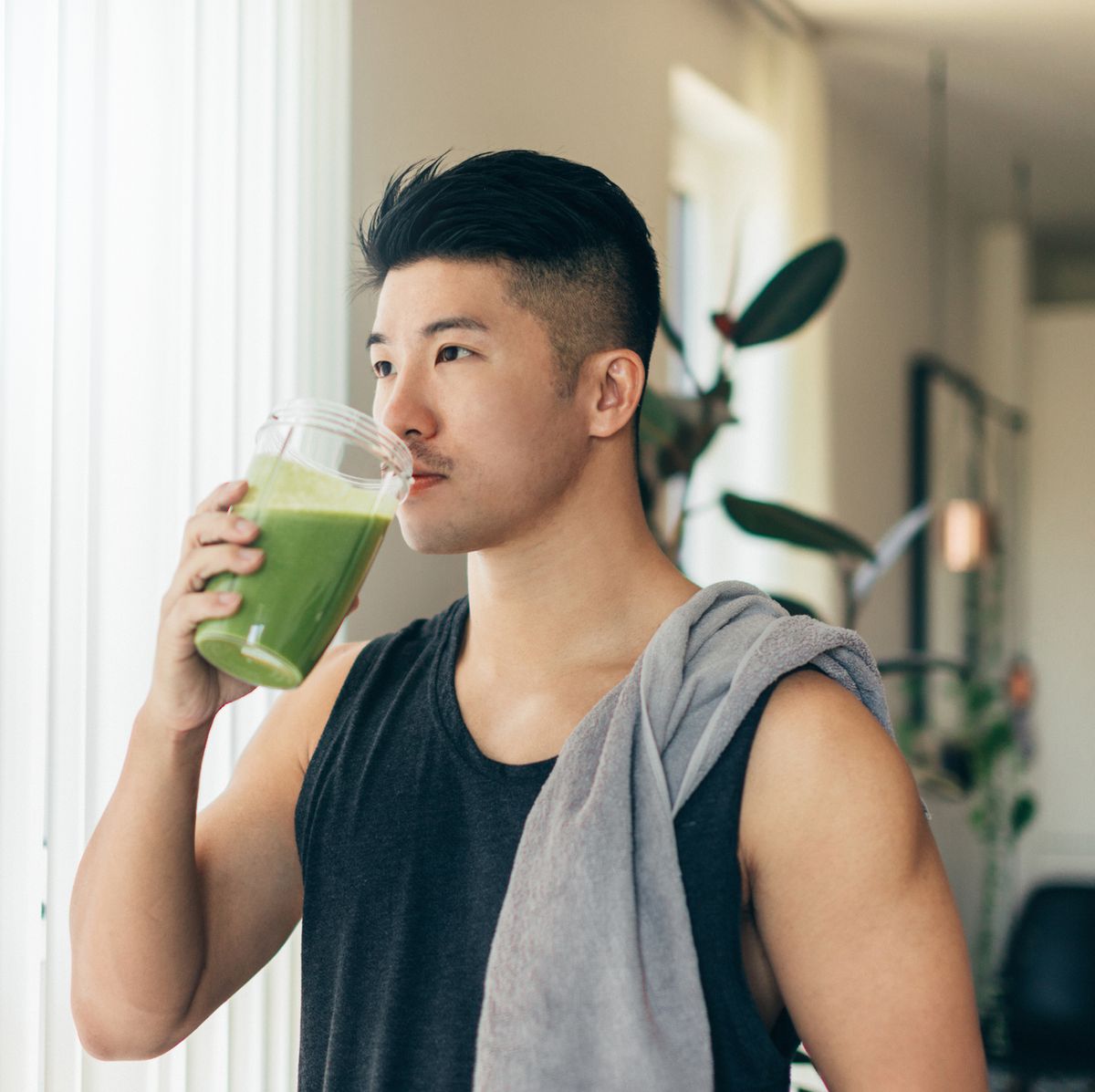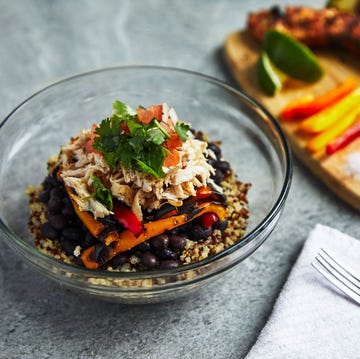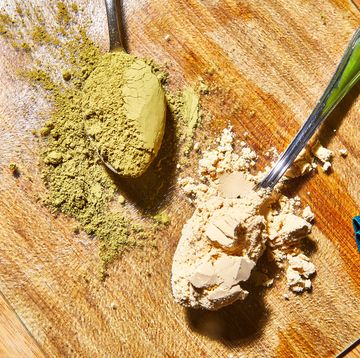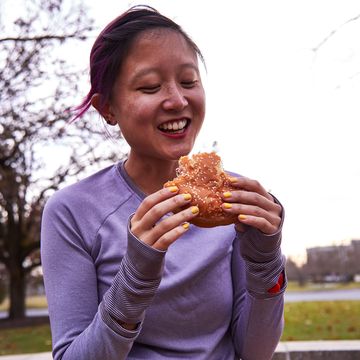As more athletes adopt different eating plans, including plant-based diets, it’s helpful to make sure your meals include enough protein to support muscle recovery and growth.
One important part of understanding protein: branched-chain amino acids or BCAAs, the building blocks of the muscle-building macronutrient. BCAAs appear to directly relate to muscle performance and repair, however, the research on supplementing with them is contradictory.
Here’s more information on BCAAs, including what they are and how they may (or may not) support your training.
More From Runner's World

What are BCAAs?
First, a quick refresher on amino acids: They are the building blocks of protein, which helps your body build muscle, repair muscle damage, and regulate immune function, among other things. While there are 20 amino acids in total, nine are essential—essential, because your body can’t produce them, but you need them to live.
BCAAs are three specific essential amino acids that inhibit muscle protein breakdown and aid in glycogen storage: leucine, isoleucine, and valine. Because BCAAs are essential, you have to get them from your diet.
“Any complete protein will contain all amino acids, and therefore BCAAs,” Monica Auslander Moreno, R.D.N., founder of Essence Nutrition tells Runner’s World. These include animal-sourced products such as eggs, meat, poultry, fish, and dairy. “You can also find [BCAAs] in other plant-based protein sources,” Moreno adds, including peanuts, chickpeas, lentils, quinoa, and whole grains. When grains and legumes are eaten together (think: rice and beans or peanut butter on whole grain bread), they make up a complete protein.
“What makes BCAAs unique is that they can be oxidized in the muscles for fuel,” explains Angie Asche, R.D., of Eleat Sports Nutrition. “They work to prevent muscle breakdown during exercise, and are beneficial after exercise by stimulating muscle building and promoting recovery.” So when your glycogen stores run low, your body turns to BCAAs for fuel.
These three amino acids make up approximately one-third of muscle protein, explains Kristin Koskinen, R.D.N., of Eat Well Pros. And “while other amino acids are metabolized in the liver, BCAAs bypass the liver and head directly to muscles located away from the core,” says Asche, which could aid in energy production. Research has even linked BCAA consumption to increased resistance to fatigue, reduced muscle damage, and increased muscle mass.
“Theoretically, BCAAs reduce fatigue during prolonged exercise by preserving glycogen stores,” explains Koskinen. “Remember, BCAAs can act as fuel during exercise and can be delivered more efficiently to muscles.”
These amino acids may also help you bounce back faster after that track workout. “BCAAs inhibit cortisol, which can cause muscle breakdown, and therefore contribute to faster muscle recovery (and less soreness),” says Auslander. “And leucine in particular is great at stimulating muscle protein synthesis—it acts almost like a command sergeant in lining up other amino acids to together form new muscle tissue.”
What should you know about BCAA supplements?
So if you can consume BCAAs pretty easily through your diet, should you take supplements? The reality is, most people get enough BCAAs from the food they already eat, says Koskinen. “People who aren’t eating enough protein or carbs may benefit, but it’s much more effective to make diet corrections than try to supplement your way to peak performance,” she adds.
In fact, a 2017 scientific review published in the Journal of the International Society of Sports Nutrition found that there is no evidence that BCAA supplementation alone helps with muscle protein synthesis. Meanwhile, a systematic review and meta-analysis published in 2021 in the journal Amino Acids found that while BCAAs may help with muscle recovery by reducing delayed onset muscle soreness, the high variability in the studies included make it difficult to know whether BCAAs are efficient for untrained participants, when to take supplements, and whether higher dosage is a good idea.
Still some experts say that people with GI issues or those who have a hard time eating anything before early morning workouts could benefit. “Consuming a serving of a BCAA 2:1:1 supplement (2 grams leucine to 1 gram valine and 1 gram isoleucine) 15 minutes before a workout or run [may] offer a readily absorbed protein and energy source,” says Koskinen.
One small study backs up the benefits of pre-workout BCAAs. Published in The Journal of Sports Medicine and Physical Fitness in 2018 and involving 15 young men, researchers found that taking a BCAA before exercise reduced soreness after the workout.
How much BCAAs you would need is pretty individualized, says Auslander. “It’s based on weight, gender, and physical activity, type, and time,” she explains, so talking to an R.D. before experimenting would help you figure out what might work for you. But “total amounts of five to 10 grams per day seem to provide the most benefit.”
It’s important to note that supplements aren’t regulated, and even though BCAAs don’t have any known negative side effects, you always have to be very careful about where you buy from, what’s in the supplements, and how much you take (groups like NSF or Informed Choice provide reputable certifications). However, while BCAAs might help you feel less fatigued during a workout or sore after a workout, they may not actually improve your performance.
Plus, BCAAs aren’t cheap. “Other less expensive, convenient options may be better suited for providing not only the BCAAs but the other essential amino acids necessary,” says Koskinen. For example: Whey is a complete protein, with all nine essential amino acids that is also quickly digested and absorbed.
Before you start popping supplement pills or dropping any kind of powder into your water, talk to a registered dietitian who has experience working with runners. Remember that nutrients are better absorbed when they come from food, so upping your protein intake via whole, healthy foods should always be your first choice.













